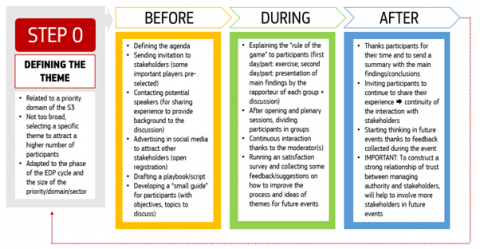The Entrepreneurial Discovery Process and COVID-19

Smart Specialisation Strategy (S3) is a place-based policy concept to support regional prioritisation in innovative sectors, fields or technologies through the entrepreneurial discovery process (EDP), a bottom-up approach to reveal what a region does best in terms of its science and technology endowments. At the heart of S3 is thus the concept of EDP, which emphasises the importance to prioritise "investment based on an inclusive and evidence-based process driven by stakeholders’ engagement and attention to market dynamics" (European Commission, 2016).
The EDP recognises that the regional government does not have innate wisdom or the ex-ante knowledge about future priorities. Consequently, the EDP aims to select and to prioritise regional technological trajectories that should be supported through research and innovation policy tools by the regional government.
In October 2019, the Policy Learning Platform published an article on the Entrepreneurial Discovery Process – The S3 Engine. Although the findings and tools proposed in the article are still valid today, the COVID-19 pandemic and its impact on physical distancing has transformed the way the EDP is conducted in many European regions. The Joint Research Centre S3 Platform published a report titled rethinking the 'Entrepreneurial Discovery Process' in times of physical distancing that presents the lessons learned through the pilot actions conducted with the Alentejo and Algarve regions of Portugal for prototyping online events to support the “Entrepreneurial Discovery Process”.

Figure 1. Pros and Cons of online meetings. Source: Joint Research Centre S3 Platform
Prior COVID-19 pandemic, the EDP process was usually conducted through a series of in-person workshop-events or thematic working groups to select S3 priorities and actions. With the new reality of "physical distancing" due to the Covid-19 pandemic, the rapid rise in the use of synchronous communication tools for all kinds of meetings and events suggests that in-person EDP events could be adapted to online events/workshops. The cases of Alentejo and Algarve give some insights for the organisation of online events for conducting the EDP (see Figure 2 below).

Figure 2. Steps of an online EDP workshop. Source: Joint Research Centre S3 Platform
The COVID-19 pandemic is also transforming the way the EDP in conducted in Interreg Europe projects such as in BEYOND EDP, PASSPARTOOL, and S3CHEM.
Nathalie Boulanger, DEV’UP Centre-Val de Loire, France, BEYOND EDP lead partner, highlights that in Centre-Val de Loire, the public authorities have developed supportive measures towards private companies and have set up coordination actions for different regional intermediaries to support the EDP. Regional economic developers interviewed more than 1800 regional companies to identify their needs, difficulties, and inform them about measures to overcome specific economic challenges.
As the coordinator of the network, DEV’UP collected feedback from regional intermediary organisations. Based on real-time feedback, a weekly analysis allowed the public authorities to adjust the operational measures to the difficulties identified during the COVID-19 crisis.
Jennifer Grisorio, Regional Agency for Technology and Innovation, ARTI Puglia, Italy, PASSPARTOOL lead partner, points out that regional policymakers have become more internet savvy thanks to the pandemic and better at working in online settings. Compared to 18 months ago, we have acquired digital skills that have improved online interactions. These new modes of working—provided the right people and structures are in place—increase the flexibility of the EDP. Not only because online sessions are easier and quicker to organise, but also because they can become more attractive to new profiles.
It is almost impossible for an SME to travel to an EDP workshop that lasts for a few hours and is two hours away by car, whilst it is far easier to join in on a 90-minute online meeting. In turn, it is easier to organise follow-up activities, such as priority-specific working groups. Last but not least, it is easier to connect local stakeholders with international ones, as required by the new enabling condition (criterion 7).
Paz Palacio Fernández, IDEPA, Spain, S3CHEM partner, points out that during the COVID-19 crisis, there have been changes in the stakeholder’s engagement that might be somehow related to the breakdown of supply chains and to the need to increase collaborations. Multinationals in our region are rethinking their relationship with local partners.
One example is the new private initiative—Field Digital Lab—in which companies from the chemical, steel or energy sector are identifying common challenges in the field of predictive maintenance to be addressed through joining forces, finding local technology and scientific solutions, and accelerating their digitalisation transformations.
Interreg Europe projects’ partners have some insights to share to conduct an effective EDP during the COVID-19 pandemic.
Jennifer Grisorio, Regional Agency for Technology and Innovation, ARTI Puglia, PASSPARTOOL lead partner, highlights that the pandemic has heightened the complexity of the EDP. An EDP process is based on meaningful, informed, and structured interactions among stakeholders. Conducting such interactions online increases the risks of disengagement and fatigue, and thus might turn the EDP into a compliance process rather than an opportunity for greater regional engagement.
In an online setting, it is important to carefully select stakeholders, based not only on their profile, but most importantly also on their actual interest in the process. It is also crucial, for the organiser, to have adequate communication skills, to engage participants in the discussion. Finally, the sessions need to be short, structured and to the point: good moderation and well-defined participatory exercises are essential.
Paz Palacio Fernández, IDEPA, S3CHEM stresses that the EDP was difficult to conduct during the first stage of the COVID pandemic in which the urgencies were answered on an individual basis to respond to specific and pressing industrial and societal challenges.
In the second stage of the COVID pandemic, the EDP greatly benefitted from having already existing channels for dialogue. The previous work done (since 2016) in the framework of Asturias Paradise Hub 4 Circularity, and the initiatives taken in the framework of Asturias Digital Hub (since 2019), offered data analysis and channels for dialogue that allowed us to respond to companies’ new expectations and priorities.
Read our article on The Entrepreneurial Discovery Process (EDP) – The S3 Engine
